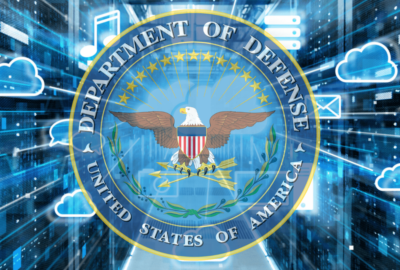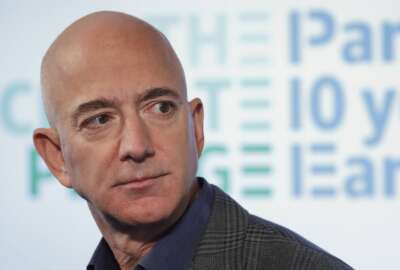Bezos’ legal team protests federal contracts like no other
When it comes to federal contracts, Amazon seems to follow a simple three-word formula: protest, protest protest.
Best listening experience is on Chrome, Firefox or Safari. Subscribe to Federal Drive’s daily audio interviews on Apple Podcasts or PodcastOne.
Amazon and its founder Jeff Bezos didn’t get to where they are by acting timid. When it comes to federal contracts, Amazon seems to follow a simple three-word formula: protest, protest protest. And it works. That’s according to an investigation by Bloomberg Government reporter Josh Axelrod, who joined the Federal Drive with Tom Temin.
Interview transcript:
Tom Temin: Josh, good to have you in studio.
Josh Axelrod: Tom, thanks so much for having me.
Tom Temin: And what did you find? You looked at the protest patterns by Amazon cloud services, Amazon Web Services, basically. And what did you discover here?
Josh Axelrod: Right. Well, Jeff Bezos wields the strategy of extraordinary aggression. That’s as one source put it to me. I know it might sound a little redundant to talk about competition when we’re in the realm of government contracting here. But Bezos turns it up a notch. I mean, it’s really leave no stone unturned, fight every battle, use every tool at his disposal. And there’s really two key contracts, we can look at that illuminate this approach.
Tom Temin: Right, the non-contract, you might say, or the dead program of JEDI at the Defense Department occupied what – four three, four or five years here. What happened there?
Josh Axelrod: So in 2019, in a surprise move, the Pentagon awarded the JEDI contract to Microsoft despite Amazon Web Services being the market leader in cloud services. Bezos went right to the Court of Federal Claims. He made a pretty unusual argument alleging interference from then President Donald Trump. And the court sustained his protest that the Pentagon ended up just scrapping the program entirely. Saying that they were going to create a new program that joint warfighter cloud capability that was going to go to two awardees. Industry insiders say likely Microsoft and AWS so that’s an extreme success for Bezos there recouping lost dollars.
Tom Temin: They were able to convince a court of that, I guess, but the legal process was back and forth. And it lasted over two years. So they were really persistent in that. And I think they had a bunch of arguments also on the technical front, which might have taken up more legal time for Microsoft and for Amazon, even in the Trump administration questions.
Josh Axelrod: Right. One source told me that Bezos’ legal team goes after every morsel and nugglet they can find. These are top notch lawyers, the best that money can buy, obviously. These are folks who are typically arguing in front of the Supreme Court. So they are going after every single thing that they can look for to make this argument to ultimately recoup those dollars, whether or not they’ve been successful. In the case of JEDI, extremely successful. In the case of NASA’s Lunar Lander, it’s more of a mixed bag.
Tom Temin: So the JEDI replacement is going to be called the Joint Warfighter Cloud Capability. There have been no awards yet. So it’s kind of speculation that they would go to both AWS and Microsoft. What then could we expect? Suppose they go to Microsoft and Company X. Oracle has a cloud, IBM has a cloud, Google has a cloud, lots of non-household names that have clouds.
Josh Axelrod: Sure, it’s absolutely an open competition. Though industry insiders and watchers say that AWS being the market leader is very likely to get the award, whether or not they do, what Bezos’ legal team has done has give him a second chance here. And it’s the exact same thing that happened with the Lunar Lander. They lost a contract to Space X last year. The protests ended up not working, they went to GAO, they went to the Court of Federal Claims. But using another tool in Bezos’ toolbox, Blue Origin’s lobbying might was able to secure the prospect of a second lunar lander, a $10 billion lunar lander that he’s gonna get another stab at. So, again, industry watchers say Blue Origin, Bezos’ company, very likely to get that second lunar lander. Nothing’s definite, but getting that second stab is certainly very valuable to Bezos.
Tom Temin: We’re speaking with Josh Axelrod. He’s reporter for Bloomberg Government. And before we get more into the SpaceX situation I wanted to come back to the Blue Origin situation. I wanted to come back to the legal teams that you mentioned that Bezos and Amazon hire, what are the firms?
Josh Axelrod: Yeah, and you can look to some of my reporting and to some of my colleagues at Bloomberg Government who have been following the play by play here. These are folks who are typically arguing in front of the Supreme Court, whose job it is to go after every single thing that they can go after. And that’s yielded extreme success for AWS and for Blue Origin. These are folks like Ted Olson and Ted Boutrous at Gibson Dunn, folks who are typically arguing in front of the Supreme Court, wielding what sources told me and called a scorched earth protest strategy.
Tom Temin: It’s almost the way Microsoft fought in court, what was it 20 years ago against the anti-trust and so forth with the Clinton administration. So I guess what goes around comes around in some ways. And talking about the lobbying effort more than the legal protest effort, when SpaceX got the NASA award and Blue Origin wanted it, so it sounds like the lobbying investment – it’s been pretty substantial also for for Amazon.
Josh Axelrod: Absolutely, I say that this is all part of a larger strategy that Bezos wields. He is relentless not just in using protests, but using every arrow he has in his quiver. So when the protest to GAO didn’t work he went to the Court of Federal Claims. Amid these legal proceedings, he took the move of writing an open letter to the NASA administrator, offering a couple billions-dollar discount. When all of this didn’t work, he used Blue Origin’s lobbying power to get Sen. Maria Cantwell from the state of Washington, where Blue Origin is headquartered, to introduce legislation that was going to get the second $10 billion lunar lander. Of course, Sen. Bernie Sanders tried to get it canceled, he called it a Bezos bailout. But his effort a few months back failed. And it looks likely that NASA is going to create the second lander for redundancy.
Tom Temin: That’s a good point, because the NASA administrator is not actually a source selection authority. And under the regulations, you can’t lower your bid after an award has been made, and then expect to get the award. It’s simply not legal under federal acquisition regulations. So that’s when they move to the lobbying. We should also point out that in your reporting, they haven’t done or accomplished anything illegal, they just simply use the existing apparatus in a way that is sort of breathtaking.
Josh Axelrod: Certainly nothing illegal here, but it’s a strategy that could come back to bite them in the butt. As I said, sources told me this is a scorched earth strategy. And what they mean by that is that a protest can be a double-edged sword. Of course, if you’re able to protest and recoup lost dollars, or at least as we’re talking about the prospect of lost dollars, that’s a massive success. At the same time, what you’re essentially doing is lambasting the government, pointing out every dysfunction and inadequacy in the process, what one source called basically “calling them the village idiot and then asking for more money.” Of course, acquisition officials are going to tell you they’re unbiased, they’re not going to let their personal feelings enter into the equation. I know if I were in their shoes, I might have some choice words for Bezos, if he came back to me ask him for more money.
Tom Temin: That’s what they say about the federal market. It’s one of the few where you can regularly sue your customer, and still get business. Josh Axelrod is a reporter for Bloomberg Government. Thanks so much for joining me.
Josh Axelrod: Great to be here.
Copyright © 2024 Federal News Network. All rights reserved. This website is not intended for users located within the European Economic Area.
Tom Temin is host of the Federal Drive and has been providing insight on federal technology and management issues for more than 30 years.
Follow @tteminWFED






